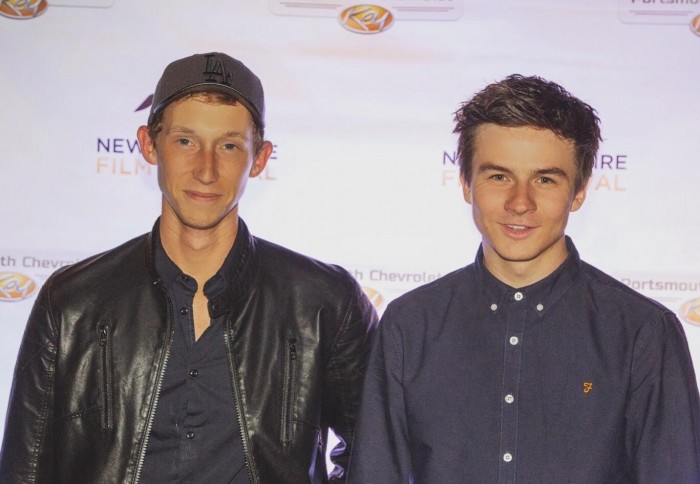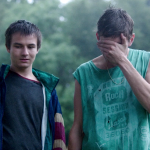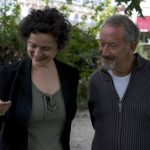With his dark, moving, often surprisingly comical feature debut, British director Joe Stephenson is quickly establishing a name for himself as a talent to watch. An adaptation of an acclaimed stage play from Freddie Machin, Chicken is the unusual, compassionate story of the young Richard (portrayed on both stage and screen by Scott Chambers), a teenage boy with notable learning difficulties who lives in a caravan with his erratic brother Polly (Morgan Watkins) and who finds a new friend in local girl Annabel (Yasmin Paige). It is a bold, affecting work that contrasts its lead’s childlike view of the world with a harsh, tragic reality.
Speaking to FilmDoo, Machin discusses how this brave and compelling feature came to be.

How did you come across Freddie Machin’s play and what made you want to adapt it?
I first became aware of the play when my best friend was cast as Richard: Scott Chambers. Not living in London at the time, he stayed at mine during rehearsals and I, going over lines and discussing the character at length every evening, became very attached to the play and the character. Then when I saw the production, I felt there was more to be said and something I could bring to the table. And perhaps most importantly, I felt there was a way to tell the story cinematically. I wondered if perhaps adapting it for screen might actually allow us to go deeper than a play could do, do things they couldn’t due to the natural restrictions there are in theatre.
Was much changed from Machin’s original script?
Interestingly, I feel both a lot and very little has changed. Those restrictions in theatre meant certain things could not be done. On a very basic level, there was no chicken! On film we could have a real chicken and form a real relationship between Richard and Fiona. On a more complex level, there were psychological complexities you couldn’t handle on stage as the actors are playing for the audience at the back of the theatre as much as the front row. I have the ability to take the audience close, have them see the subtle signs of trouble (or, equally, the subtle signs of affection) in a slight glance. Then on the other side, I was able use visual metaphors and thematics to enhance the story and audience’s emotions.

Did you do much research on learning disorders in preparation for the film?
Yes, both myself and Scott discussed Richard’s learning difficulties at length, hours and hours of discussion. At one point I even got Scott a book on childhood development, as we felt much of Richard’s emotional (and in some cases physical) challenges stem from neglect, lack of social engagement with children his age, nutritional deprivation in his earliest years, not to mention the forms of abuse he has suffered time and time again. We then looked at what might have been there that wasn’t environmental, and a couple of disorders did keep coming up.
But we ultimately felt that, to label him and start looking at a checklist of symptoms would make for a very technical performance. When the truth of the matter is that no one person is exactly the same, even if you do have a specific learning difficulty. And beyond that, the film is told largely from his perspective, and he doesn’t know much about why people treat him differently. He just exists and responds, as we all do, and that felt like the more honest and sensitive way to portray him on film.
Throughout Chicken, we get hints at other stories happening mostly off-camera, be it with Annabel’s family or at Polly’s work. Were you tempted to explore these various avenues further when making the film?
At one point there was more of those things yes, particularly with Annabel’s situation – and some of which we shot. But, in the edit, it felt like we might be spoon feeding the audience a little. How much do you really need to know for the character to feel true and for you to understand the circumstances that are important to the core story we are telling? Not much actually, because that’s our experience of life. We don’t know every moment of people’s lives, we don’t know everything that is happening in every corner. We make conclusions based on the events we may be witnesses to and the information they choose to tell us. So since the emotional backbone of the film was always Richard, we know very little more about Polly and Annabel than Richard does. I want the audience to understand them the way he does and come to the conclusions he might.

Your prior experience seems to be largely in television. Do you feel that the role of director comes with different duties and expectations when you’re working on the big rather than small screen?
Well my experience with TV is minimal, I did a series based around actors performing monologues for Sky Arts and that’s it. That was like my film school. Chicken was the first time I directed a scene with more than one person interacting, making this question a little hard to answer but I think the best television – and the reason there have been so many leaps forward recently in TV drama particularly – is because TV execs are cottoning on to the fact that there should be very little difference.
The only difference for me is (and this is key and why film is my love) the emotional journey of the 90-min story. Getting from A to B in one sitting, holding your attention, taking you somewhere and making you feel something. You go in knowing nothing, and, if I have done my job, within only 90 minutes you find yourself so connected to a story or character, that you have felt very real emotions and, with a bit of luck, learnt something about other people or yourself along the way.
Do you have any plans for future projects yet?
Lots of plans, lots of projects. I’ve wanted to be a filmmaker since I was 7 so I have folders of stories. But my next is a documentary I found myself unable to resist making, even though documentary was never an ambition of mine, and then I’m following that with a drama about the early life of Noel Coward which I couldn’t be more excited about starting.





